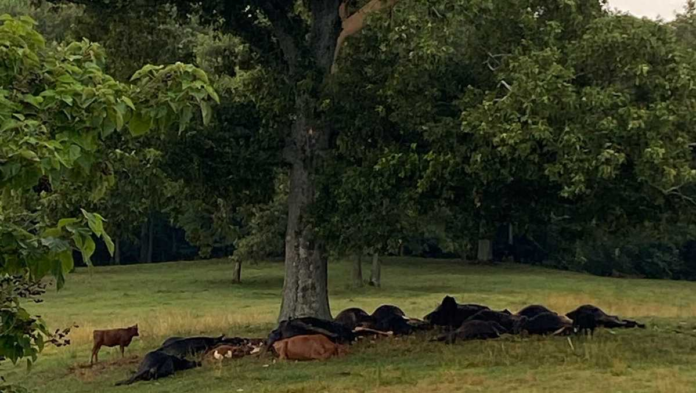
BERLIN, Ala. – Lightning killed 31 cattle on the farm of Daymin Gardner in Berlin during Saturday afternoon’s thunderstorms. The cattle were taking shelter under a large tree when the tree appeared to have been hit.
Daymin Gardner’s brother Tim Gardner posted a photo of the scene on social media late Saturday afternoon.
According to a 2015 United States Department of Agriculture report, in a one-year study period from 2014-2015, weather was the fifth most common cause of unwanted death among American cattle. Lightning, hail, flooding and other weather incidents accounted for over 418,000 deaths during the study period.
A 2022 Princeton University Press article by Georgetown University professor Timothy Jorgensen noted that cows are more likely to suffer lightning strikes than other farm animals; they tend to remain exposed or take shelter under large trees, which are common targets of lightning. The animals do not usually suffer direct strikes, but are impacted by current radiating across the ground from the tree. As cows are large and their front and back legs are far apart, the ground voltage can differ from the front to back legs, increasing the chance of injury or death.
Since cows huddle when sheltering, the loss of multiple animals is common in lightning strikes. According to Jorgensen’s report, “Losses of 10 to 30 cows at a time are regularly reported.” The largest known loss of cattle occurred in Australia in 2005, when a single strike killed 68 head.
The National Weather Service warns that trees and other tall objects increase the likelihood of lightning strikes. Cows have no choice but to take their chances, but NWS offers advice to people to help lower the risk. First, “If thunder roars, go indoors!” Inside is safer than outside in a thunderstorm. If you must be outside:
- Avoid open fields, the top of a hill or a ridge top.
- Stay away from tall, isolated trees or other tall objects. If you are in a forest, stay near a lower stand of trees.
- If you are in a group, spread out to avoid the current traveling between group members.
- If you are camping in an open area, set up camp in a valley, ravine or other low area. Remember, a tent offers no protection from lightning.
- Stay away from water, wet items such as ropes, and metal objects such as fences and poles. Water and metal do not attract lightning, but they are excellent conductors of electricity. The current from a lightning flash will easily travel for long distances.
For more on weather safety, visit www.weather.gov/safety/lightning.
Attempts to reach the Gardners for comment were unsuccessful.
Copyright Humble Roots LLC, 2023. All Rights Reserved.




















